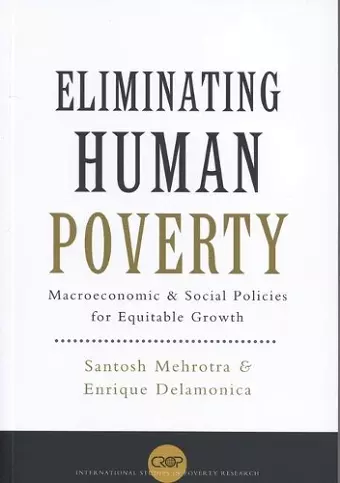Eliminating Human Poverty
Macroeconomic and Social Policies for Equitable Growth
Santosh Mehrotra author Enrique Delamonica author
Format:Paperback
Publisher:Bloomsbury Publishing PLC
Published:19th Apr '07
Currently unavailable, and unfortunately no date known when it will be back

Drawing on their own broad-ranging research at UNICEF and UNDP, the authors argue that fiscal, monetary, and other macro-economic policies for poverty reduction, human development and economic growth can be compatible with micro-level interventions to provide basic social services.
This book focuses on the provision of basic social services - in particular, access to education, health and water supplies - as the central building blocks of any human development strategy. The authors concentrate on how these basic social services can be financed and delivered more effectively to achieve the internationally agreed Millennium Development Goals. Their analysis, which departs from the dominant macro-economic paradigm, deploys the results of broad-ranging research they led at UNICEF and UNDP, investigating the record on basic social services of some 30 developing countries. In seeking to learn from these new data, they develop an analytical argument around two potential synergies: at the macro level, between poverty reduction, human development and economic growth, and at the micro level, between interventions to provide basic social services. Policymakers, they argue, can integrate macro-economic and social policy. Fiscal, monetary, and other macro-economic policies can be compatible with social sector requirements. They make the case that policymakers have more flexibility than is usually presented by orthodox writers and international financial institutions, and that if policymakers engaged in alternative macro-economic and growth-oriented policies, this could lead to the expansion of human capabilities and the fulfillment of human rights. This book explores some of these policy options. The book also argues that more than just additional aid is needed. Specific strategic shifts in the areas of aid policy, decentralized governance, health and education policy and the private-public mix in service provision are a prerequisite to achieve the goals of human development. The combination of governance reforms and fiscal and macro-economic policies outlined in this book can eliminate human poverty in the span of a generation.
'This book has an ambitious agenda. It offers a framework for conceptualizing macroeconomic policies on the assumption that people matter. The authors demonstrate a sure grasp of the complexities of policy-making to reduce poverty. This book offers an indispensable guide to policy makers and development practitioners.' Professor Ajit Singh, Faculty of Economics, University of Cambridge 'This book gets to the core of what will be needed to revive economic growth after the slowdown in much of the developing world over the last 25-30 years - by reversing the deflationary tendency of much contemporary macroeconomic policy.' Jomo K. S., Assistant Secretary-General for Economic Development, UN Department of Economic and Social Affairs 'A vital reference for donors, NGOs and others wanting to see the MDGs achieved - but uncertain how much it will cost. The analysis and 30 country case-studies provide important evidence and hard analysis to fill the gap between over-simple estimates of costs and over-cautious pessimism on policies.' Sir Richard Jolly, former architect of the Human Development Report 'This book is the blueprint for eradicating world poverty in the 21st century. Forget Stiglitz, move on from Sachs: this book based on over a decade of committed work in UNDP and UNICEF marks the real turning point away from neo-liberalism in the global discourse about economic and social policy.' Bob Deacon, Professor of International Social Policy, Director of Globalism and Social Policy Programme, Sheffield University, UK 'This is an excellent, timely book...Innovative, clearly written, readable and draws on a comprehensive range of research.' Dr David Lewis, Reader in Social Policy, London School of Economics
ISBN: 9781842777732
Dimensions: unknown
Weight: unknown
448 pages